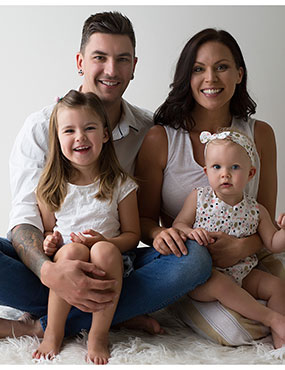Genetics are part of the key to beating MND
Luke Smith’s father, Mick, died from MND in 2017 after 15 years living with the disease. Genetic tests on Luke’s siblings revealed no trace of the genes known to cause MND. But Luke found out he was a carrier of familial MND.

Genetics part of beating familial MND
“It took a long time to sink in and I felt pretty horrible,” says Luke. “But I came good after about six months.” Newly married to Cobie, the couple, both 24 years old at the time, decided to use IVF to conceive. “It was pretty clear to us once I discovered I was gene-positive,” Luke says. “We’d watched my father deteriorate and suffer.
“We knew we wanted to have kids but we didn't want them to carry this gene, so doing IVF was an easy decision for us. The technology’s there, so why not use it?” Luke and Cobie started the IVF process in March 2012. Cobie says it was very difficult and stressful. “I found it hard mentally and I wouldn’t wish it on my worst enemy,” she says. “But it has given us peace of mind down the track.”
“We were the first couple with hereditary MND that our fertility doctor had dealt with,” Cobie says. “I felt totally isolated. There was no one else in my life who could understand what I was going through. We were walking into the unknown.”
Cobie says she’d love to talk to other couples to give them the support they themselves never had.
Their first daughter was born in December 2013 and their second in 2017.
Rosie Fell is one of the genetic counsellors at the Multidisciplinary MND Service and Clinic. She counsels patients and relatives of patients about familial MND.
Individuals may be referred to her by Professor Dominic Rowe if he suspects they have inherited MND because multiple members of their family have had the disease. Some individuals request a referral themselves, as they are concerned about a personal or familial risk of MND.
Fell gathers family history information from both maternal and paternal sides. If relevant, she will then offer genetic testing. “Our role is to give our patients all the information in a way that they can understand, so they can make an informed decision about their health and decide what to do next,” Fell says. “If their MND is genetic, then that may have implications for other family members.”
Luke provides biological samples to the Neurodegenerative Diseases Biobank. Mick was a patient of Professor Dominic Rowe at the multidisciplinary MND service and clinic.